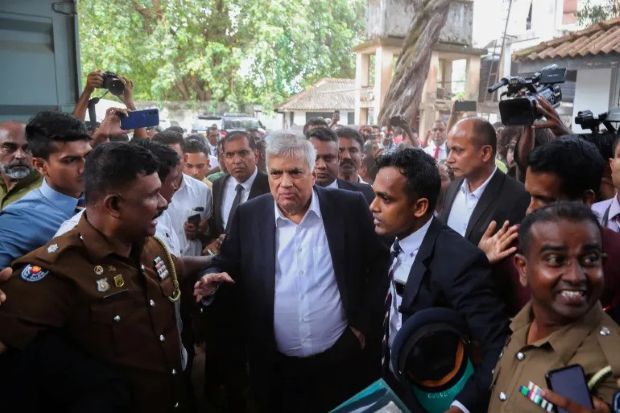Hearing in Ranil Wickremesinghe’s misuse of funds case postponed to January 2026
COLOMBO – The Colombo Fort Magistrate’s Court on Wednesday (29) postponed the hearing of the case filed under the Public Property Act against former President Ranil Wickremesinghe until January 28, 2026, as investigations into the alleged misuse of state funds continue.
Wickremesinghe, who is currently out on bail, appeared in court accompanied by his wife, Professor Maithree Wickremesinghe, for the hearing. The case pertains to allegations that state funds were used to cover travel and related expenses for the former president, his staff, and security detail during an official visit to the United Kingdom in 2023. The visit included attending a ceremony at a British university where Professor Wickremesinghe was conferred an honorary professorship.
Colombo Fort Magistrate Isuru Neththikumara instructed the Criminal Investigation Department (CID) to expedite its ongoing probe and to produce before the court any other suspects if sufficient evidence arises. The Magistrate also ordered the CID to inquire into incidents that took place near the court premises during an earlier hearing to determine whether they amounted to contempt of court, and to identify and report those responsible by the next date.
The case was taken up at the Colombo Fort Magistrate’s Court at around 1:30 p.m. on Wednesday.
Former President Wickremesinghe was arrested on August 22, 2025, after appearing before the CID to record a statement over the allegations. He was subsequently produced before the Colombo Fort Magistrate’s Court and remanded until August 26.
Following a review of medical reports submitted by his legal team, Fort Magistrate Nilupuli Lankapura ordered Wickremesinghe’s release on three surety bails of Rs 5 million each, and the case was scheduled to be recalled on October 29.
The allegations centre on the alleged misuse of public funds to facilitate the former President’s visit to the UK while serving as Head of State.
Legal observers note that this is one of the few instances in Sri Lanka’s post-independence history where a former President faces court proceedings under the Public Property Act, highlighting both the legal and political significance of the case.
-ENCL



Comments are closed, but trackbacks and pingbacks are open.